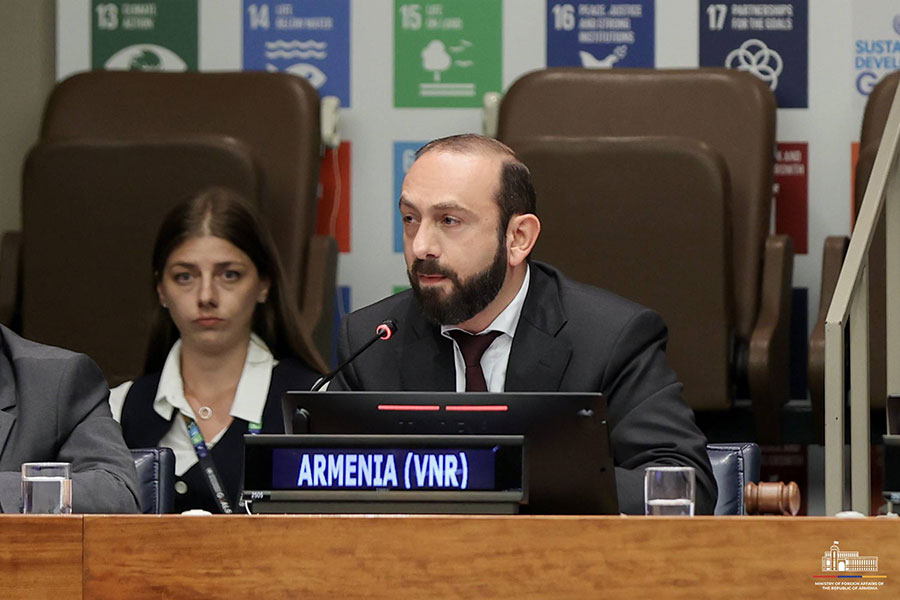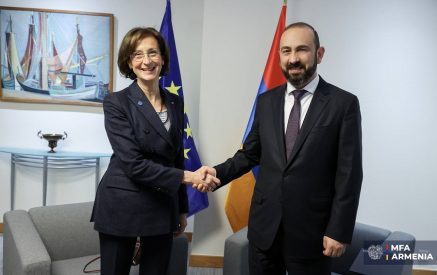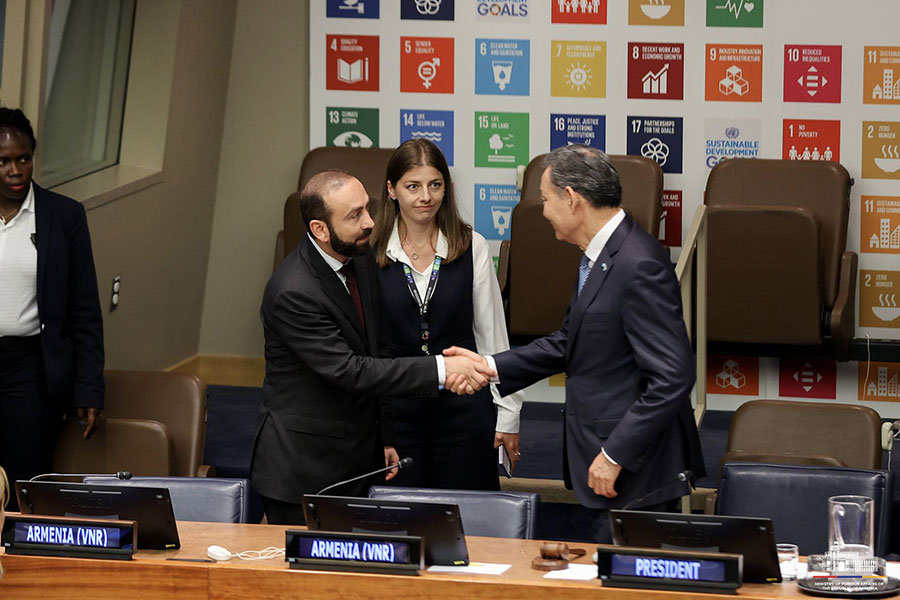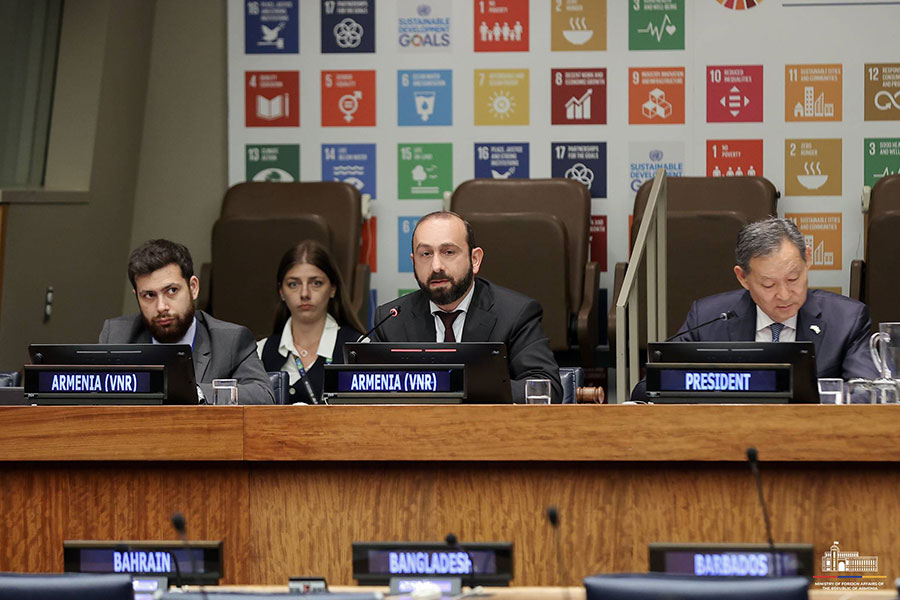Presentation of the 3rd Voluntary National Review on Sustainable Development
On July 15, in New York, Minister of Foreign Affairs of the Republic of Armenia Ararat Mirzoyan presented Armenia’s 3rd Voluntary National Review (VNR), summarizing the progress in implementing the 2030 Agenda for Sustainable Development, including its goals and targets.
The Minister’s full remarks are presented below.
Following Minister Mirzoyan’s intervention, delegates of countries representing broad geographical engagement, made their assessments and asked questions on various aspects of implementation of SDGs. The list of the countries included Germany, Greece, India, Lithuania, Mexico, Lebanon and Uzbekistan. A representative of the civil society also asked a question.
Read also
“Distinguished Chair,
Excellences, ladies and gentlemen,
It is my pleasure to address this High-level Political Forum and present the third voluntary national review of Armenia.
The last four years were unprecedented due to the pandemic, acts of aggression, ethnic cleansing, and refugee crisis. Although these negative developments could potentially overturn the efforts towards the Agenda 2030, Armenia proved that it is possible to deliver on the promise of the SDGs and create hope for progress, prosperity, and peace.
Therefore, Armenia’s 3rd VNR is about the experience of resilience, humanitarian action, and steadfast efforts towards transforming the SDGs into real benefits and building back better with a strong bearing on peace and justice at home and in the region. It is a real-time example of the impact of the nexus between humanitarian action, development and peace on the achievement of Agenda 2030.
Allow me to present a brief overview of each of the elements of the humanitarian, development and peace nexus and their interplay in Armenia’s experience of implementing the SDGs.
Humanitarian action: Struggling with the consequences of the COVID-19 pandemic, Armenia had to face yet another calamity. The large-scale military aggression of Azerbaijan against Nagorno-Karabakh in the fall of 2020, a 10-month-long blockade, starvation and the ethnic cleansing of the region in 2023 claimed thousands of lives, caused massive destruction and humanitarian crisis. More than 115,000 forcibly displaced refugees – the entire indigenous population of the region, fled to Armenia over a few days under the threat of persecution and atrocity crimes.
On 26 October 2023, by the Government decision, temporary protection status was granted to refugees from Nagorno-Karabakh, providing access to social protection mechanisms, healthcare, education and psychosocial services for refugees. The Government’s efforts and the solidarity of the Armenian society were instrumental in addressing the immediate and medium-term needs of the refugees. Over 160 mln USD has already been spent from the national budget for accommodation, food and other essential needs through direct cash assistance and other relevant mechanisms. At the current stage the Government has launched a long-term housing program as well as taking concrete steps to address the employment issues of the refugees, 1/3 of which – teachers, medical workers, entrepreneurs have already been employed or started their own businesses.
In addition to above mentioned challenges, in 2021 and 2022 the Republic of Armenia faced large-scale military aggression and occupation of its sovereign territories, which in its turn resulted in internal displacement and major violations of the rights of the people residing in bordering regions.
At the time of finalizing Armenia’s third VNR for submission, Armenia faced another unprecedented climate calamity due to torrential rainfall and severe flooding in May 2024 in the Lori and Tavush regions of Armenia, with significant damage to 9 urban and 28 rural communities and the critical civilian infrastructure.
Mr. Chair,
The next component – Development: Against all odds, Armenia maintained a steady pace of progress and sustainable development.
Institutionally, the main development priorities of Armenia were formulated in the Armenia Transformation Strategy 2050 aimed at eradicating poverty, promoting food security, stimulating human development and environment-friendly economic growth.
Major economic reforms, effective fiscal policies and inflation targeting contributed to the steady growth of the economy with up to double-digit GDP and the overall improvement of the country’s socio-economic outlook. This enabled the Government to deliver on its promise of leaving no one behind. In this regard, establishment of the Social Emergency Support system has been a key undertaking. The system, while continuing social assistance to the most vulnerable, conceptually aims to empower them to graduate from social dependency to self-sufficiency through income generation.
The overall unemployment rate in Armenia in the years 2020 to 2022 has decreased from 18.2 percent in 2020 to 13.5 percent in 2022, and the percentage of the population living below the national poverty line decreased from 1.1 percent to 0.8 percent, lifting thousands above the poverty line.
Armenia is committed to building a knowledge based and inclusive economy. Highly educated and talented people have always been the competitive advantage of our country. With this in mind, the allocation of resources to education has registered more than 25 percent growth during the past four years.
Aiming to provide quality education the Government has introduced merit-based compensation scheme for professionals and has been progressing on its commitment of constructing and renovating 300 schools and 500 pre-schools by 2026. To ensure sufficient nutrition of schoolchildren the Government nationalized and is successfully implementing “School feeding programme” in 10 regions of Armenia.
The Government of Armenia is paying special attention to STEM education and relevant platforms as a link to higher education and, later, high-tech industry. Here, allow me also to introduce the recent significant initiative of building the Academic city, that will ensure coherence and synergy among education, research and industry.
Armenia has elaborated a comprehensive agenda for green transition with an equal focus on climate change mitigation and adaptation efforts. Specifically, in 2021, the country adopted its Nationally determined contributions for 2030 with the commitment to reduce its GHG emissions by 40% by 2030 compared to 1991 levels, as well as to increase the share of green energy production, along with other provisions. To coordinate and monitor the implementation of the provisions of the Paris Agreement, the Government has established an inter-agency coordination council. Another major undertaking related to the country’s green transition is the “Green Armenia” platform, which aims to ensure a high-level policy dialogue on green transition with its major development partners.
The biggest refurbishment and overhaul of the country’s nuclear power plant in conformity with international nuclear safety standards is also key to the country’s carbon neutral development. Additionally, investments in the renewable energy sector with an ambitious goal to triple the share of solar energy production to at least 15% by 2030 is high on the Government’s agenda.
Peace at home: The Government of Armenia has been steadfast in its efforts to achieve peace, both at home and in the region. We strongly believe that sustainable development can be achieved only on the firm bedrock of strong democratic institutions, protection of fundamental human rights, justice, peace in the society and in the region.
Truly believing in citizen’s say and elections to be the most peaceful and civilized way to resolve domestic political crises, in 2021 the Government of Armenia decided to conduct snap parliamentary elections regardless of the extreme security challenges that country was facing. It is noteworthy, that these elections once again were marked as fully free and fair by all reputable international observation missions. These elections reconfirmed that democracy in Armenia is irreversible.
Building on the will of the people, the Government has continued major reforms in the governance and judiciary system, strengthening of democratic institutions and social protection and the uncompromised fight against corruption, which are among top priorities for Armenia regardless of already accomplished achievements.
Armenia has also been consistently promoting women’s and girls’ rights, their empowerment and meaningful participation in decision-making processes in all spheres of public life – both on regional and national levels. Noteworthy, women are assuming leadership positions in legislative and executive bodies, with steadily increasing representation in security and law enforcement structures.
Democratic resilience was also instrumental in fostering strong public support for the Government’s initiatives to achieve peace in the region.
Peace in the region: This brings me to the last but, in fact, most crucial undertaking of our country within the last years, to achieve a long-term peace and stability in our region.
Armenia is genuinely engaged to conclude the agreement on the establishment of peace and interstate relations with Azerbaijan, anchored in the principles of mutual recognition of each other’s territorial integrity and delimitation of the state border based on the 1991 Alma-Ata Declaration, and unblocking regional transport infrastructure based on full respect for the countries’ sovereignty and jurisdiction, as well as the principles of equality and reciprocity.
With this understanding, Armenia has initiated the “Crossroads of Peace” project. This project aims to develop communications between Armenia and its neighbouring countries, thus transforming the whole paradigm of relationships in the region from confrontation to mutually beneficial cooperation.
Armenia also continuously undertakes significant efforts towards full normalization, establishing diplomatic relations and opening borders with Türkiye which, if successful, understandably will have a huge positive impact on the region.
Ladies and gentlemen,
To conclude, I would like to emphasize that based on the lessons learned from the third VNR, Armenia will continue its efforts towards overcoming structural constraints and vulnerabilities. Advancement of democracy, human rights, rule of law, gender equality, special focus to the most vulnerable will serve as a backbone for our future action to achieve the SDGs and prepare for post-2030 action.
Thank you!”
Ministry of Foreign Affairs

























































